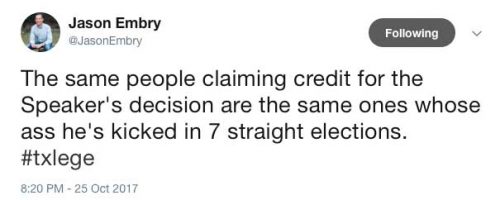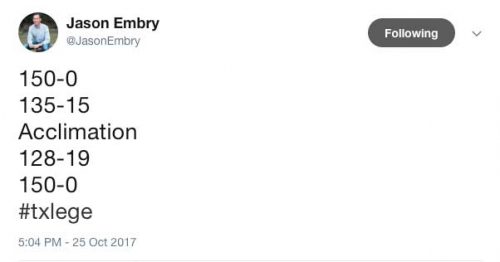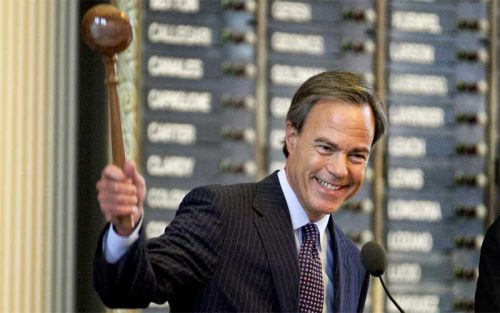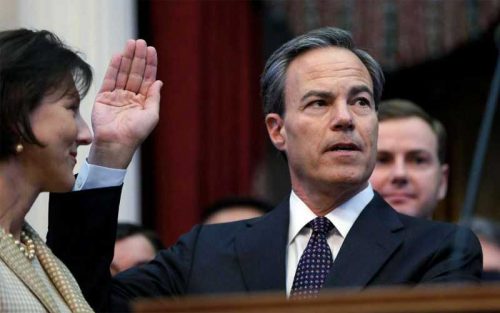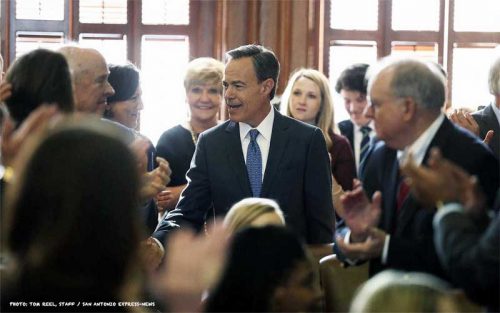The following op-ed appeared in the Houston Chronicle and is reposted in an effort to get more people registered and voting.
By Texas House Speaker Joe Straus
Monday is the last day to register to vote in the 2018 Republican and Democratic primaries. If you aren’t already registered to vote, please do so. You can find all the information you need about voter registration at votetexas.gov.
But if you want more of a say in how our state and your community are run, registering to vote is only the beginning. In fact, while all of us want more people registered, what we really need in these primaries is more people voting.
Party primaries matter because they often effectively determine the winners of the November elections. But most Texans aren’t in the habit of voting in these crucial March contests. In 2014, the last time there was a primary in a non-presidential year, only 10 percent of registered Texas voters took part in the Republican primary, and only 4 percent of registered voters voted in the Democratic primary. These were hardly inconsequential elections: That year, we elected a new governor, lieutenant governor, attorney general and comptroller, among important statewide officeholders.
In fact, less than half the people who voted Republican for governor that November had cast a ballot in the GOP primary just eight months earlier. In other words, about 1.4 million Texans who felt compelled to vote Republican in the general election did not take part in choosing the Republican nominees.
Small primary turnout creates a disconnect between the 28 million people who live in Texas and the small number of us entrusted with its leadership. Low turnout in primaries gives elected officials an excuse to focus on pleasing a narrow set of voters, interest groups and priorities. In fact, at the end of last year’s legislative session, I lamented the fact that there had been more urgency surrounding so-called bathroom bills (which were not a priority of mine) than fixing our school finance system (which was a priority of mine). But many in the state Capitol felt greater pressure from primary voters to act on misguided bathroom proposals than on the more difficult work of improving the way we fund public education.
The primary campaigns playing out across the state right now are about much more than choosing nominees for November’s general election. These elections are a chance for voters – not party leaders, but voters – to declare which solutions and governing approaches best fit this moment in our state’s history.
I, for one, want a Republican Party that embraces and embodies traditional Republican principles such as fiscal discipline and local control, while also looking forward and recognizing that Texas is an increasingly diverse state with diverse needs. I want our party to focus on the serious challenges that affect all Texans and all communities, rather than seizing on divisive wedge issues that accomplish little more than stoking fears and hostilities. I want our party to provide lasting, substantive solutions to challenges like high property taxes.
The ongoing primary campaign season is the time to have those conversations, because it’s the time that candidates and officeholders are listening most closely. A campaign should be an exchange of ideas rather than a battle of interest groups, and the transformation begins when we bring more people into the discussion.
Much has been made of the need for the business community to get involved in primary elections, and I agree. Texans on the front lines of growing our private-sector economy need to take a more active role. But the same also goes for educators, veterans, senior citizens, young people and anyone else who cares about the future of our state. A larger electorate will make officeholders consider a broader set of concerns.
The next Legislature will face some very significant challenges, from disaster relief to school finance to needed reforms at state agencies. That’s to say nothing of the many important decisions that will be made in the years to come by county commissioners, judges, sheriffs and other local officials who will be on the March primary ballot. The primary is not your last chance to influence government’s direction from Washington on down, but it is one of your best chances.
So please register if you haven’t already. But remember: There isn’t much point in getting registered if you don’t actually vote. Early voting in the primaries begins February 20. Between then and 7 p.m. on Election Day on March 6, we will all have a golden opportunity to tell our elected leaders what their priorities should be.
Joe Straus, a Republican state representative from northeastern Bexar County, is the Speaker of the Texas House.
It’s hard to imagine just how much better Texas would be if November Republicans voted in March.
Related:
It’s time for the Oust Straus crowd to step up and fund the RPT
Oust Straus caucus still whining after winning
Speaker Joe Straus: the most courageous politician in Texas?
Chosin Reservoir, Freedom Caucus, Straus, and the Special Session
